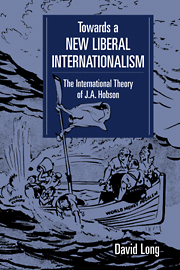Book contents
- Frontmatter
- Contents
- Acknowledgements
- 1 Introduction
- 2 Rationality, welfare and the organic analogy
- 3 Co-operation, the surplus and the theory of underconsumption
- 4 An evolutionary framework for international relations
- 5 The domestic determinants of an imperialistic foreign policy
- 6 The international relations of imperialism
- 7 Economic internationalism, free trade and international government
- 8 International government and the maintenance of peace
- 9 J. A. Hobson and liberal internationalism
- Notes
- Bibliography
- Index
- LSE MONOGRAPHS IN INTERNATIONAL STUDIES
9 - J. A. Hobson and liberal internationalism
Published online by Cambridge University Press: 12 September 2009
- Frontmatter
- Contents
- Acknowledgements
- 1 Introduction
- 2 Rationality, welfare and the organic analogy
- 3 Co-operation, the surplus and the theory of underconsumption
- 4 An evolutionary framework for international relations
- 5 The domestic determinants of an imperialistic foreign policy
- 6 The international relations of imperialism
- 7 Economic internationalism, free trade and international government
- 8 International government and the maintenance of peace
- 9 J. A. Hobson and liberal internationalism
- Notes
- Bibliography
- Index
- LSE MONOGRAPHS IN INTERNATIONAL STUDIES
Summary
This concluding chapter examines Hobson's contribution to liberal international theory. Hobson's approach is presented first through a look at his ideas on sovereignty, diplomacy and the balance of power. Hobson is then placed in the context of the liberal tradition of international thought, specifically with reference to Richard Cobden, Norman Angell and David Mitrany. Next, the effect of the First World War and war in general on Hobson's liberalism is considered. There follows a comparison of Hobson's new liberal internationalism with Robert Keohane's neoliberal institutionalist approach to international relations. I conclude with a discussion of Hobson's contribution to international thought.
Hobson was a major figure in the transformation of the liberal tradition of international thought. It should be noted in passing that he would have considered the term ‘liberal tradition’ an oxymoron. Liberalism, for Hobson, was a rationalist (constructively) critical political philosophy that challenged the oppressive traditions and customs of society. In any event, Hobson's part in the transformation of liberalism has begun to receive scholarly attention of late. We are no longer in the dark as to how the liberalism of Cobden, J. S. Mill and Gladstone (to take a rather diverse group of nineteenth-century liberals) became the liberalism of today, associated with the welfare state and intervention in the economy.
- Type
- Chapter
- Information
- Towards a New Liberal InternationalismThe International Theory of J. A. Hobson, pp. 173 - 197Publisher: Cambridge University PressPrint publication year: 1995

